Tenley Campus
The Immaculata Seminary Historic District, commonly known as Tenley Campus, is an 8.2-acre (3.3 ha) parcel of land, located off of Tenley Circle in the Northwest Washington, D.C. neighborhood of Tenleytown. The site of Dunblane, an early to mid-nineteenth century Federal/Greek Revival-style manor house, it was once part of a large country estate on the outskirts of the capital city, owned by a succession of prominent Georgetown residents. From 1904 to 1906, the land was acquired by the Catholic Sisters of Providence of Saint Mary-of-the-Woods, who, for decades, operated all-girls primary, secondary, and postsecondary schools there under the Immaculata name, before being forced to shutter due to financial issues. Since 1986, it has been a satellite campus of American University, which purchased the site in part because of its proximity to Tenleytown station on the Red Line of the Washington Metro. It currently houses the school's Washington College of Law.
Immaculata Seminary Historic District | |
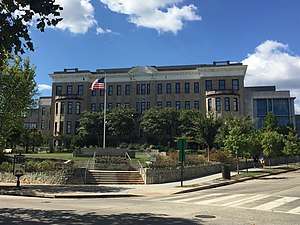 WCL's Capital Building, the former Immaculata Seminary, from Tenley Circle in 2019 | |
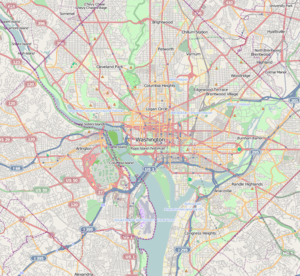  | |
| Location | 4300 Nebraska Avenue NW, Washington, D.C., United States |
|---|---|
| Coordinates | 38°56′44″N 77°04′50″W |
| Area | 8.2 acres (3.3 ha) |
| Built | c. 1839–2016 |
| Website | Official website |
| NRHP reference No. | 14000209 |
| Significant dates | |
| Added to NRHP | May 19, 2014 |
| Designated DCIHS | October 27, 2011 |
The district reflects Tenleytown's evolution from a rural Washington County community to a densely-populated streetcar suburb, as well as the Catholic Church's role in education, particularly of women, during the twentieth century. It was added to the District of Columbia Inventory of Historic Sites in 2011 and the National Register of Historic Places in 2014. Development of the site that took place preceding the law school's move in 2016 preserved the existing character of outdoor spaces and incorporated historic structures, including Dunblane and the original 1905 A. O. Von Herbulis-designed seminary building, which has long stood prominently above passing traffic along Wisconsin Avenue.
Geography
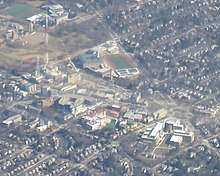
Tenley Campus sits atop a knoll, fronting the western edge of Tenley Circle, at the intersection of Nebraska Avenue, Wisconsin Avenue, and Yuma Street NW in Northwest Washington, D.C.'s Tenleytown neighborhood. The eight acre Tenley Campus is bounded by Yuma Street NW to the north; Warren Street NW to the south; Nebraska Avenue NW and Tenley Circle NW to the east; and 42nd Street NW to the west.
The block to the north is mostly institutional in character. It contains St. Ann Catholic Church and its rectory, the former Convent de Bon Secours, Janney Elementary School, and the Tenley-Friendship Neighborhood Library, as well as the historic N. Webster Chappell House. The rest of the surrounding area is residential; American University Park is to the west, consisting almost entirely of single-family detached homes. American University's main campus is about a half a mile away, at the intersection of Nebraska and Massachusetts Avenues.
History
Church use
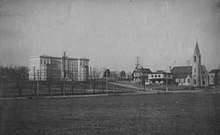
In 1902, with the support of Father Joseph C. Mallon, pastor of St. Ann Catholic Church in Tenleytown, the Sisters of Providence of Saint Mary-of-the-Woods, an order of religious sisters based in Indiana, announced plans to open a religious school in northwest Washington on land purchased from St. Ann's rectory.[1][2] Two years later, another plot of land, this one across the street, was bought to spare the rectory from demolition.[3] The plans followed a request by Cardinal James Gibbons, Archbishop of Baltimore, for the establishment of a "select school for girls" in the District. A new building for this purpose was designed by architect Albert Olszewski Von Herbulis, and, on July 2, 1904, the cornerstone was placed atop what the Sisters dubbed "Mount Marian."[4][5]
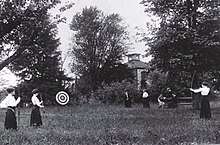
The Seminary of Our Lady Immaculate – or "Immaculata," for short – was completed the following year. It was so named in honor of the golden jubilee of Pope Pius IX's Ineffabilis Deus, which defined the dogma of the Immaculate Conception of the Virgin Mary.[6][7] On September 8, the school hosted Cardinal Gibbons, who blessed the structure and then helped conduct a solemn high mass at St. Ann's; a sermon written for the occasion was given by F. X. McCarthy of Washington's St. Aloysius Church.[8][7] Additional guests at the ceremonies included Bishop of Indianapolis Silas Chatard, President David H. Buel of Georgetown University, and other representatives of Catholic churches and organizations from around the region.[9] Mother Superior Mary Cleophas Foley, also present, received a congratulatory letter from Cardinal Sebastiano Martinelli in Rome, passing along well-wishes on behalf of Pope Pius X.[7] In 1906, the Sisters purchased the rear portion of the block, consolidating the land that would later comprise the U.S. historic district.[10]
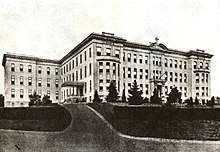

On December 8, 1955, the day of the Feast of the Immaculate Conception, Amleto Cicognani, Apostolic Delegate to the United States laid the cornerstones for three new buildings at Immaculata: Marian, Loretta, and Regina Halls.
Acquisition by American University
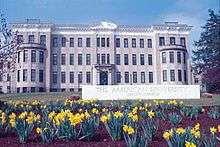
In 1978, following the closure of Immaculata Junior College, American University began renting space in Marian Hall to address the need for additional student housing; shortly thereafter, they also started leasing Immaculata's gymnasium for evening use.[11] AU officially took possession on December 4, 1986.[12] After renovations were completed, the campus housed the university's Washington Semester and study abroad programs.[13]
Purchased in 1987 by AU, Tenley Campus was acquired to alleviate space problems at the university's main campus. This campus was popular with interns because of its close proximity to the Tenleytown-AU Metro station on the WMATA Red Line. It was formerly home to the School of Professional & Extended Studies, including the Washington Semester Program, as well as University Publications, the Media Relations department, and the Osher Lifelong Learning Institute.
- Federal Hall—Housed 128 students; Contained the mailroom, computer lab, and dining hall (Tenley Café).
- Congressional Hall—Housed 173 students; contained reception desk and Resident Director's office.
- Constitution Building—Contained the Washington Semester Program, University Publications, Alumni Relations, and other administrative offices.
These offices and the buildings that housed them were largely demolished in 2013 to make way for a new home for the Washington College of Law. In 2016 a slew of new academic buildings designed by architectural firm SmithGroupJJR were completed, and the Washington College of Law was formally relocated to Tenley Campus.
The new law school was formally dedicated on February 12, 2016. In attendance were Mayor of the District of Columbia Muriel Bowser and Associate Justice of the Supreme Court of the United States Ruth Bader Ginsburg, who gave the keynote address at the event.[21]
Significant contributing properties
 Dunblane, with its 1935 and 1974 additions visible at left
Dunblane, with its 1935 and 1974 additions visible at left 1921 garage and laundry building, currently used by American University facilities management
1921 garage and laundry building, currently used by American University facilities management
Immaculata Seminary and chapel (Capital Hall)
Dunblane
Garage and laundry
Present use

New and Renovated Buildings (c. 2016):
- Capital Hall-Older but newly renovated former cathedral. Houses law school admissions and administrative services.
- Warren Building-Completely new academic building. Features various classrooms, offices and the Pence Law Library.
- Yuma Building-Another completely new academic building. Houses a number of classrooms, faculty offices, and other academic and administrative spaces.[22]
Tenley Campus's buildings are Gold-certified by Leadership in Energy and Environmental Design (LEED).[23]
See also
- National Register of Historic Places listings in western Washington, D.C.
- Dumblane, an NHRP-listed home built in 1911, across Warren Street from the Immaculata campus
References
- "Georgetown News and Gossip of Interest". The Evening Times. August 2, 1902. p. 8. Retrieved September 17, 2019.
- "Plan's for New St. Ann's Church Rectory". The Evening Times. October 24, 1902. p. 10. Retrieved September 17, 2019.
- "Affairs in Georgetown". The Evening Star. May 20, 1904. p. 13. Retrieved October 14, 2019.
- Goldchain, Michelle (2019). DC by Metro: A History & Guide. Chicago: Arcadia Publishing, Inc. p. 35. ISBN 9781439666616.
- "Corner Stone Laying at Sisters of Providence Building". The Evening Star. July 2, 1904. p. 3. Retrieved September 17, 2019.
- The Catholic Church in the United States of America: Undertaken to Celebrate the Golden Jubilee of His Holiness, Pope Pius X. II. New York: The Catholic Editing Company. 1914. p. 434. ISBN 9780524063668.
- "Blessed by the Pope". The Washington Post. September 7, 1905. p. 7.
- "In Local Churches". The Evening Star. September 2, 1905. p. 12. Retrieved September 17, 2019.
- "Catholic School Formally Blessed". The Washington Times. September 8, 1905. p. 3. Retrieved September 17, 2019.
- "Sisters of Providence Add to Their Holdings". The Evening Times. March 28, 1906. p. 8. Retrieved October 13, 2019.
- "Sale to Spur Space Review". The American Scene. October 11, 1984. p. 5. Retrieved October 21, 2019.
- "AU Takes Over Immaculata Site; Renovations Underway". The American Scene. December 18, 1986. p. 3. Retrieved October 21, 2019.
- "Campus Changes Continue Apace". American. Fall 1986. p. 13. Retrieved October 31, 2019.
- Feinberg, Lawrence (October 4, 1984). "Immaculata Students Mourn Loss of Their Schools". The Washington Post. Retrieved September 30, 2019.
- Feinberg, Lawrence; Hodge, Paul; Lewis, Nancy (October 5, 1984). "Parents, Grads Protest Sale Of Immaculata". The Washington Post. Retrieved October 29, 2019.
- Feinberg, Lawrence (February 19, 1986). "AU Cancels Plans to Move Law School to Tenley Circle". The Washington Post. Retrieved September 30, 2019.
- Feinberg, Lawrence (May 10, 1986). "Immaculata Graduates Last Class NW Campus Sold". The Washington Post. Retrieved September 30, 2019.
- Glass, Nicole (January 31, 2011). "AU Hopes to Move WCL to Tenley Campus". The Eagle. Retrieved October 1, 2019.
- DePillis, Lydia (October 12, 2011). "ANC Fights Preservation Group Over Designation of AU's Tenley Campus". Washington City Paper. Retrieved October 1, 2019.
- Fiegenbaum, Katie (May 1, 2012). "D.C. Approves WCL Move to Tenley Campus". The Eagle. Retrieved October 1, 2019.
- Lim, David (February 15, 2016). "Ruth Bader Ginsburg Delivers Keynote at Unveiling of New Washington College of Law". The Eagle. Retrieved September 30, 2019.
- AU WCL Fact Sheet http://www.american.edu/buildingAU/upload/WCL-Fact-Sheet-12-22-15.pdf Retrieved 21 August 2016
- "WCL Case Study" (PDF). American University. March 29, 2017. Retrieved October 30, 2019.
External links
| Wikimedia Commons has media related to Tenley Campus. |